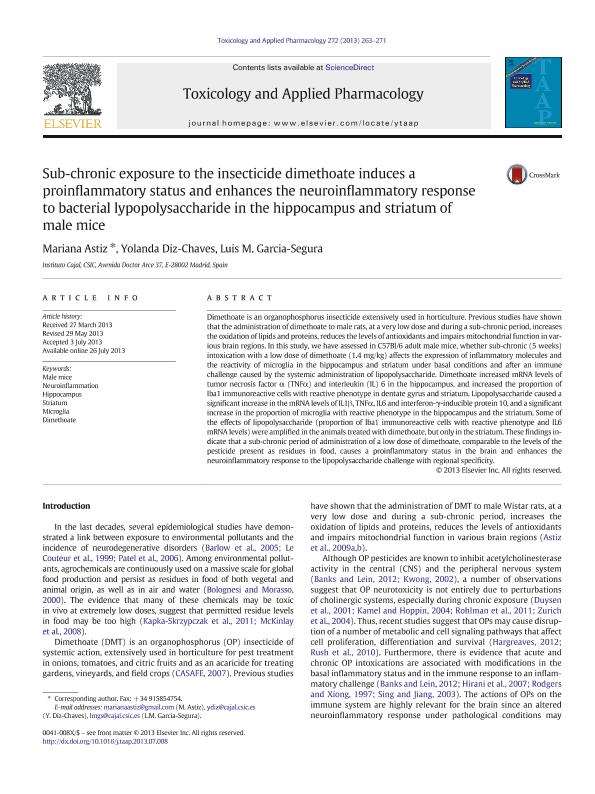Artículo
Sub-chronic exposure to the insecticide dimethoate induces a proinflammatory status and enhances the neuroinflammatory response to bacterial lypopolysaccharide in the hippocampus and striatum of male mice
Fecha de publicación:
15/10/2013
Editorial:
Academic Press Inc Elsevier Science
Revista:
Toxicology and Applied Pharmacology
ISSN:
0041-008X
Idioma:
Inglés
Tipo de recurso:
Artículo publicado
Clasificación temática:
Resumen
Dimethoate is an organophosphorus insecticide extensively used in horticulture. Previous studies have shown that the administration of dimethoate to male rats, at a very low dose and during a sub-chronic period, increases the oxidation of lipids and proteins, reduces the levels of antioxidants and impairs mitochondrial function in various brain regions. In this study, we have assessed in C57Bl/6 adult male mice, whether sub-chronic (5 weeks) intoxication with a low dose of dimethoate (1.4 mg/kg) affects the expression of inflammatory molecules and the reactivity of microglia in the hippocampus and striatum under basal conditions and after an immune challenge caused by the systemic administration of lipopolysaccharide. Dimethoate increased mRNA levels of tumor necrosis factor α (TNFα) and interleukin (IL) 6 in the hippocampus, and increased the proportion of Iba1 immunoreactive cells with reactive phenotype in dentate gyrus and striatum. Lipopolysaccharide caused a significant increase in the mRNA levels of IL1β, TNFα, IL6 and interferon-γ-inducible protein 10, and a significant increase in the proportion of microglia with reactive phenotype in the hippocampus and the striatum. Some of the effects of lipopolysaccharide (proportion of Iba1 immunoreactive cells with reactive phenotype and IL6 mRNA levels) were amplified in the animals treated with dimethoate, but only in the striatum. These findings indicate that a sub-chronic period of administration of a low dose of dimethoate, comparable to the levels of the pesticide present as residues in food, causes a proinflammatory status in the brain and enhances the neuroinflammatory response to the lipopolysaccharide challenge with regional specificity
Palabras clave:
Dimethoate
,
Hippocampus
,
Male Mice
,
Microglia
,
Neuroinflammation
,
Striatum
Archivos asociados
Licencia
Identificadores
Colecciones
Articulos(INIBIOLP)
Articulos de INST.DE INVEST.BIOQUIMICAS DE LA PLATA
Articulos de INST.DE INVEST.BIOQUIMICAS DE LA PLATA
Citación
Astiz, Mariana; Diz Chaves, Yolanda; Garcia Segura, Luis Miguel; Sub-chronic exposure to the insecticide dimethoate induces a proinflammatory status and enhances the neuroinflammatory response to bacterial lypopolysaccharide in the hippocampus and striatum of male mice; Academic Press Inc Elsevier Science; Toxicology and Applied Pharmacology; 272; 2; 15-10-2013; 263-271
Compartir
Altmétricas




